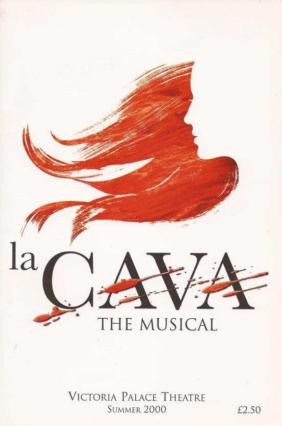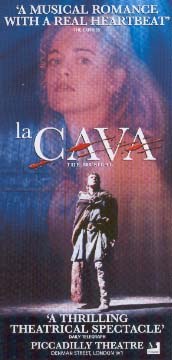La Cava
Musical (2000)

Based on Broccoli's novel Florinda, its title is derived not from the sparkling wine but for the Spanish word for a scarlet woman. The plot, based on the legend of Julian, Count of Ceuta, focuses on the feisty daughter of a Spanish general whose love triangle involving King Roderic sets a massive war in motion. In the 8th century, Roderic was the last ruler of Visigothic Spain and was overthrown by the Moorish invasion.
The show was originally presented at UCLA's Freud Playhouse from the 1st-23rd July 1995 under its original title 'Florinda', starring Julie Heron as the title character and directed by David Galligan. At this point in the show's development, the music and lyrics were by O'Keefe and Claflin only.
Directed by Steven Dexter and choreographed by Mitch Sebastian, the West End production opened on June 8, 2000 at the Victoria Palace Theatre, where it ran for six weeks before transferring to the Piccadilly Theatre. It remained there until closing on February 3, 2001. The original cast included Oliver Tobias as King Roderic, Julie-Alanah Brighten as Florinda, Marilyn Cutts as the Queen, Paul Keating as her servant Agon, Daniel Redmond as Florinda's Moorish lover, David Bardsley as Florinda's father, Louisa McCarthy as Florinda's friend at court, and Patrick Romer as the evil, Jew-hating Archbishop.
Reviews were mixed. Sarah Hemming of The Financial Times described it as "not dislikeable, just rather relentless . . . Everything about La Cava is huge: big themes, grand passions, epic story, towering set, soaring score. It is like being swallowed up by a historical romance." In CurtainUp London, Lizzie Loveridge wrote, "It is an effervescent mix of stars with sex appeal, original choreography, sweet music, tongue in cheek lyrics, and high drama." David Benedict of The Times observed, "Laurence O'Keefe and Stephen Keeling's score has size, energy, and even a bit of soul." The Daily Telegraph review began, "Another day, another doomed musical. Yet of all the turkeys that have arrived on our stages recently, La Cava is the one I've enjoyed most." The review went on to say "Although the bovine stupidity of producers continue to baffle me. The backers of this show would have had a better chance of getting their money back if they had chucked it into the Thames."
Act I
I Am Proud to Call Mine
I Will Hold You
Little Girl
My Dream Came True - I & II
Within These Walls
The Bazaar
Why Did I Kiss Her?
First Kiss
Death of Somal
A Woman's Hands
The Seduction
Act II
Vengeance
Montage
Say Goodbye
Berber Dance
What Would You Do For Your Child?
Theo's Stars/The Wedding
La Cava
I Fall With You
Here I Am
I Stayed Behind/The Battle
Finale Ultimio
Aucun dossier informatif complémentaire concernant La Cava
Aucun dossier informatif complémentaire concernant La Cava

Version 1
La Cava (2000-06-Victoria Palace Theatre-London)
Type de série: OriginalThéâtre: Victoria Palace Theatre (Londres - Angleterre) Durée : 1 mois 2 semaines Nombre : 52 représentationsPremière Preview : 22 May 2000
Première: 08 June 2000
Dernière: 22 July 2000Mise en scène : Steven Dexter • Chorégraphie : Mitch Sebastian • Producteur : Star(s) : Avec: Oliver Tobias (King Roderic), Julie-Alanah Brighten (Florinda), David Bardsley (General Espatorias), Daniel Redmond (Somal), Paul Keating (Agon), Patrick Romer (Archbishop), Joshua Bancel (Tariq), Richard Woodford (Marcus), Marilyn Cutts, Luke EvansCommentaires : Dana Broccoli was the widow of the legendary producer of the James Bond films, and a successful novelist in her own right. This lavishly funded production was magnificently staged with spectacular battle-scenes. The notices were mixed, though generally they tipped towards the view that the audience would certainly get its money’s worth and lovers of great romantic, spectacular over-blown epics would have a great night’s entertainment. After seven weeks at the Victoria Palace it transferred to the Piccadilly Theatre and finally closed after a total run of eight months, closing February 3rd, 2001Presse : BRIAN LOGAN for TIME OUT says, 'La Cava' is actually rather good." He goes on to say, "Its songs aren't bland or saccharine; they can be witty or...vicious." He finishes by saying "A rollicking good yarn which deserves to succeed."
LISA MARTLAND for THE STAGE says, "There are those who probably could not wait for another victim to add to the current toll of musical turkeys, but this...might not be so easy to dismiss." She goes on to say, "Laurence O'Keefe and Stephen Keeling's music can be bland on occasion, but there are also some nice melodies.."
THE INDEPENDENT says, "Dana Broccoli's scenario began life as a novel, a form which thrives on endless complications. But on stage all that plot feels like two and a half hours of exposition. Broccoli and her composers and lyricists simply cannot turn it all into a satisfying musical scenario."
THE FINANCIAL TIMES says, "This strange event, based on the novel by Dana Broccoli (which in turn is based on historical events), is not dislikeable, just rather relentless. There are witty lines and comic moments, but they get swallowed up in the rising tide of passion and unremitting succession of events."
THE TIMES says, "On paper it promises more dramatic excitement than, say, Cats. But paper is paper and the stage the stage. La Cava is, as it turns out, far from the worst of the period musicals that have been clogging up the West End of late." THE DAILY TELEGRAPH says, "Another day, another doomed musical. Yet of all the turkeys that have arrived on our stages recently, La Cava is the one I've enjoyed most. It's tosh, of course, but often surprisingly entertaining tosh, though the bovine stupidity of producers continues to baffle me."
THE EVENING STANDARD says, "The cast do their best with a cumbersome framework. Tobias is rugged enough while the likable Julia-Alanah Brighten makes a decent stab at evolving from teenybopper to seductress to her chastened denouement."
THE SUNDAY TIMES says, "Oliver Tobias brings quiet dignity to a woefully underwritten role."

Version 2
La Cava (2000-08-Piccadilly Theatre-London)
Type de série: RepriseThéâtre: Piccadilly Theatre (Londres - Angleterre) Durée : 5 mois 2 semaines Nombre : 192 représentationsPremière Preview : 21 August 2000
Première: 21 August 2000
Dernière: 03 February 2001Mise en scène : Steven Dexter • Chorégraphie : Mitch Sebastian • Producteur : Star(s) : Avec: Oliver Tobias (King Roderic), Julie-Alanah Brighten (Florinda), David Bardsley (General Espatorias), Daniel Redmond (Somal), Paul Keating (Agon), Patrick Romer (Archbishop), Joshua Bancel (Tariq), Richard Woodford (Marcus), Marilyn Cutts, Luke EvansCommentaires : Dana Broccoli was the widow of the legendary producer of the James Bond films, and a successful novelist in her own right. This lavishly funded production was magnificently staged with spectacular battle-scenes. The notices were mixed, though generally they tipped towards the view that the audience would certainly get its money’s worth and lovers of great romantic, spectacular over-blown epics would have a great night’s entertainment. After seven weeks at the Victoria Palace it transferred to the Piccadilly Theatre and finally closed after a total run of eight months, closing February 3rd, 2001Presse : BRIAN LOGAN for TIME OUT says, 'La Cava' is actually rather good." He goes on to say, "Its songs aren't bland or saccharine; they can be witty or...vicious." He finishes by saying "A rollicking good yarn which deserves to succeed."
LISA MARTLAND for THE STAGE says, "There are those who probably could not wait for another victim to add to the current toll of musical turkeys, but this...might not be so easy to dismiss." She goes on to say, "Laurence O'Keefe and Stephen Keeling's music can be bland on occasion, but there are also some nice melodies.."
THE INDEPENDENT says, "Dana Broccoli's scenario began life as a novel, a form which thrives on endless complications. But on stage all that plot feels like two and a half hours of exposition. Broccoli and her composers and lyricists simply cannot turn it all into a satisfying musical scenario."
THE FINANCIAL TIMES says, "This strange event, based on the novel by Dana Broccoli (which in turn is based on historical events), is not dislikeable, just rather relentless. There are witty lines and comic moments, but they get swallowed up in the rising tide of passion and unremitting succession of events."
THE TIMES says, "On paper it promises more dramatic excitement than, say, Cats. But paper is paper and the stage the stage. La Cava is, as it turns out, far from the worst of the period musicals that have been clogging up the West End of late." THE DAILY TELEGRAPH says, "Another day, another doomed musical. Yet of all the turkeys that have arrived on our stages recently, La Cava is the one I've enjoyed most. It's tosh, of course, but often surprisingly entertaining tosh, though the bovine stupidity of producers continues to baffle me."
THE EVENING STANDARD says, "The cast do their best with a cumbersome framework. Tobias is rugged enough while the likable Julia-Alanah Brighten makes a decent stab at evolving from teenybopper to seductress to her chastened denouement."
THE SUNDAY TIMES says, "Oliver Tobias brings quiet dignity to a woefully underwritten role."
Pas encore de video disponible pour ce spectacle